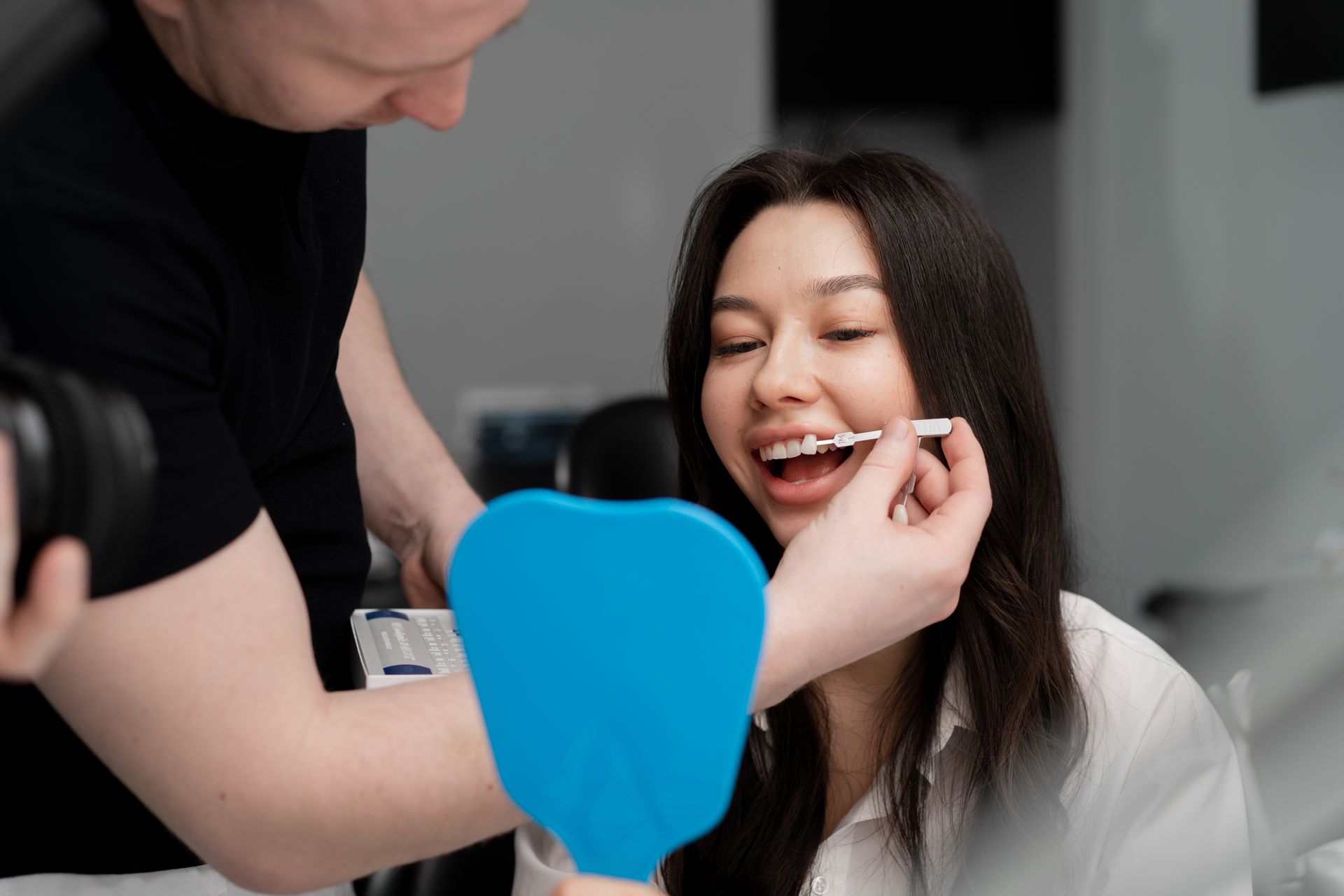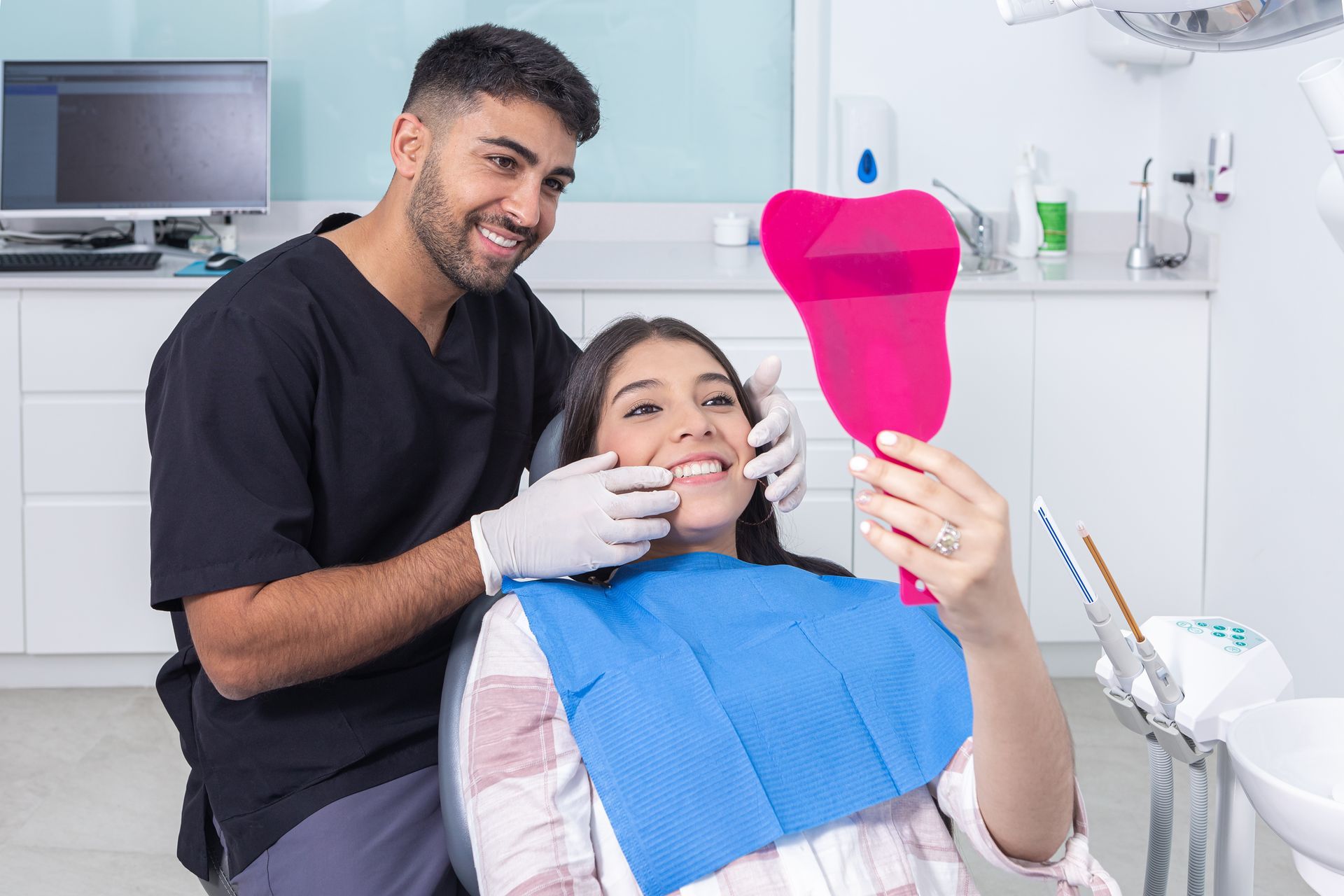Do You Wear Your Partial Dentures to Bed?

If you’re one of the many people who wear partial dentures, you may have asked yourself: “Can I sleep with partial dentures?” It seems convenient to leave them in overnight but is it safe?
Let’s dive into what dental professionals say, why it matters, and how you can protect both your dentures and your long-term oral health.
Understanding Partial Dentures
Partial dentures are removable dental appliances used to replace one or more missing teeth. Unlike full dentures, which replace an entire set of teeth, partials work alongside your natural teeth to restore your bite and smile.
They're popular because they’re less invasive than implants, more affordable, and offer a quick solution for restoring function and aesthetics.
Why Dentists Advise Removing Partial Dentures at Night
Wearing dentures 24/7 may seem like a good idea, especially for confidence or comfort. But dental experts typically recommend removing them before bed for several key reasons:
Letting Gums and Tissues Rest
Your oral tissues benefit from a break. Keeping dentures in constantly can lead to pressure sores, irritation, and reduced circulation in the gums. Removing them overnight gives your mouth time to recover and heal.
Preventing Oral Infections and Inflammation
Wearing dentures while you sleep increases the risk of denture stomatitis, a common fungal infection caused by a buildup of yeast under the appliance. This condition can lead to redness, swelling, discomfort, and even further complications if untreated.
Reducing Gum Irritation and Bone Loss
Continuous pressure from dentures can accelerate bone loss and gum recession over time. Giving your mouth time off helps maintain the integrity of the surrounding structures.
When Might It Be OK to Sleep with Them?
There are a few exceptions where leaving your dentures in overnight may be temporarily acceptable:
During the Adjustment Period
If your dentures are new, your dentist may instruct you to wear them continuously—including at night—for the first few days. This helps with initial adaptation and allows them to monitor how your mouth responds.
Dentist-Specific Recommendations
Some patients with special circumstances—such as those with bruxism (teeth grinding) or no comfortable way to remove and clean at night—may be advised differently. Always follow personalized instructions from your dentist.
Risks of Wearing Partial Dentures Overnight
Here’s what could happen if you frequently wear your partial dentures while sleeping:
Increased Bacterial Buildup
The warm, moist environment between your denture and gums is ideal for bacteria. Without proper nighttime cleaning, plaque can accumulate quickly, leading to bad breath, infections, and gum disease.
Risk of Respiratory Issues
Studies have linked wearing dentures during sleep to a higher risk of aspiration pneumonia, especially in elderly patients. Inhaling bacteria-laden particles while you sleep can cause serious lung infections.
More Wear and Tear
Wearing dentures 24/7 adds unnecessary stress on the appliance. Over time, this can lead to cracks, warping, or ill-fitting dentures—resulting in discomfort and costly replacements.
Proper Nighttime Denture Care Routine
Removing your dentures at night isn’t just about avoiding risks—it’s also about practicing good hygiene. Here’s what a proper nightly routine looks like:
Remove and Rinse
Carefully take your partial dentures out and rinse them to remove food particles and debris.
Brush Gently
Use a soft-bristled toothbrush or denture brush to clean all surfaces. Avoid using regular toothpaste. It’s too abrasive and can scratch the appliance.
Soak Overnight
Place your dentures in a denture-soaking solution or clean water while you sleep. This prevents them from drying out and helps eliminate bacteria.
Clean Your Mouth Too
Brush your gums, tongue, and any remaining natural teeth. This helps stimulate circulation and keeps your whole mouth healthy.
Recommended Daily Wear Time
For most patients, partial dentures should be worn during the day—typically 8 to 12 hours—and removed at night. This balance allows your mouth to function normally while preventing complications from constant wear.
Pay attention to any soreness, looseness, or signs of irritation. If your dentures become uncomfortable, contact your dentist to check the fit.
What to Do If You Can’t Remove Them at Night
Sometimes, patients simply can’t remove their dentures every night—whether due to travel, discomfort, or medical reasons. In those cases, here are a few alternatives:
Dental Implants or Bridges
These permanent solutions don’t need to be removed and eliminate many of the hygiene-related issues that come with removable dentures.
Soft Liners or Cushioned Fit
Ask your dentist about soft liners or adjusted fittings that make sleeping with dentures more comfortable for short periods—although this still isn’t a long-term solution.
Summary & Takeaway
So, can you sleep with partial dentures? Technically, yes but it’s not recommended. The healthiest choice is to remove them before bed to give your gums a rest, prevent infections, and extend the life of your denture.
Key Takeaways:
- Remove dentures nightly for optimal oral health
- Clean both your dentures and your mouth as part of your nighttime routine
- If you’re unsure, follow your dentist’s personalized instructions
- Consider permanent solutions if nightly removal isn’t ideal for you
Remember, your mouth needs rest just like the rest of your body. A simple nightly habit can protect your smile for years to come.

Frequently Asked Questions
Do partial dentures have to be removed at night?
Yes, it's generally recommended to remove partial dentures at night. Taking them out allows your gums and oral tissues to rest, helps prevent infections like denture stomatitis, and extends the life of your appliance.
What can you not do with partial dentures?
Avoid chewing very sticky or hard foods, using abrasive toothpaste, or sleeping with them in unless instructed otherwise. Also, never clean partial dentures with hot water, as it can warp the material.
What happens if you sleep with your partial dentures?
Sleeping with partial dentures increases the risk of oral infections, sore spots, and accelerated wear. It can also lead to poor circulation in your gums and, in some cases, respiratory issues due to bacterial buildup.
What can I wear at night instead of dentures?
If you prefer not to go without a dental appliance overnight, you can ask your dentist about options like soft liners, night guards, or permanent solutions such as dental implants or bridges.
How many hours a day should I wear my partial denture?
Most dentists recommend wearing partial dentures for 8 to 12 hours a day. Removing them overnight helps maintain oral health and reduces the risk of complications from continuous wear.








